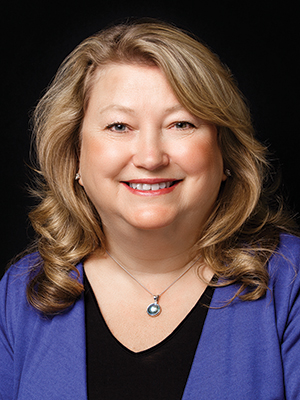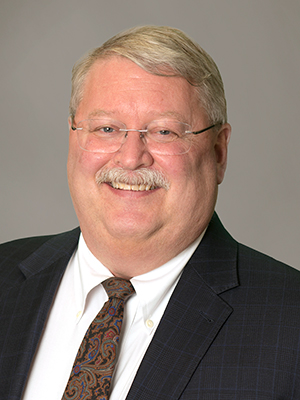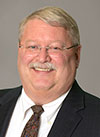March 6, 2019 – Candidates for the State Bar of Wisconsin’s president-elect post are making their cases ahead of the April election. In this Q&A, Grant Birtch and Kathleen Brost highlight how they, if elected, would tackle the challenges facing the profession.
The State Bar president-elect, decided in April along with other leadership positions, serves a one-year term (starting in July) before serving a one-year term as president.
Both candidates live and work in the Neenah area. Brost is an attorney at Legacy Privacy Trust Company. Birtch is an attorney at von Briesen & Roper, S.C. Learn more about the candidates in this profile article, published in January, and link to their bio and platform statements below.
What makes a successful State Bar President?
 Kathy Brost: The president is the spokesperson for the State Bar and its members. A successful president needs to be a vocal advocate on behalf of the State Bar, its members, and the legal profession. A successful president needs to understand and appreciate the challenges and struggles facing its members and the State Bar itself. A president needs to encourage collaboration and consensus decision making to address those challenges. A successful president is able to encourage members to contribute their own time and creative ideas to the State Bar.
Kathy Brost: The president is the spokesperson for the State Bar and its members. A successful president needs to be a vocal advocate on behalf of the State Bar, its members, and the legal profession. A successful president needs to understand and appreciate the challenges and struggles facing its members and the State Bar itself. A president needs to encourage collaboration and consensus decision making to address those challenges. A successful president is able to encourage members to contribute their own time and creative ideas to the State Bar.
 Grant Birtch: A successful State Bar president needs to be a strong advocate for the profession, the organization, and all of its members. Such advocacy requires experience, commitment, and a willingness to listen. It also requires an appreciation and understanding of the workings of the State Bar and an appreciation of the diverse needs and interests of the membership.
Grant Birtch: A successful State Bar president needs to be a strong advocate for the profession, the organization, and all of its members. Such advocacy requires experience, commitment, and a willingness to listen. It also requires an appreciation and understanding of the workings of the State Bar and an appreciation of the diverse needs and interests of the membership.
A successful State Bar president needs to find new ways to encourage a diverse group of attorneys from across the state of Wisconsin to participate in the direction and governance of the State Bar. He or she needs to be able and willing to work with the volunteer attorneys in leadership roles on the Board of Governors, sections, divisions, and committees to address the tasks and challenges facing the State Bar and our profession. He or she needs to take the lead in recognizing these volunteers for their time, work, and achievements.
A successful State Bar president must be willing to work with the professional staff and leadership of the State Bar to ensure members have input into what the State Bar provides. He or she must encourage strategic fiscally responsible decisions as to how the money is spent to meet the needs of the members.
Other Officer Candidates
For more information on the 2019 State Bar elections, visit the Elections Page.
Treasurer
Judicial Council
The State Bar has about 25,000 members (15,000 active in Wisconsin). How can the State Bar best serve a membership with diverse needs and different challenges?
 GB: How the State Bar can best serve a membership with such diverse needs and challenges is the foremost question. The answer is one that constantly changes and evolves as the practice of law and challenges to our profession change. Developing an answer requires broad participation, strategic planning, and often difficult decisions.
GB: How the State Bar can best serve a membership with such diverse needs and challenges is the foremost question. The answer is one that constantly changes and evolves as the practice of law and challenges to our profession change. Developing an answer requires broad participation, strategic planning, and often difficult decisions.
The divisions and sections help focus on practical area specific education, practice aids, and offerings. Programs like Practice 411™ help bring knowledge and assistance on administrative and technological issues. Programs like the Wisconsin Lawyer Assistance Program (WisLAP) address personal and professional issues across areas of practice. Quality publications and practice aids help keep the membership connected and current. The leadership of the bar needs to work hard to identify challenges to the profession and areas where our numbers, resources, and influence allow us to provide tangible benefits to our members.
 KB: Yes, the State Bar membership is diverse, and it faces different challenges based on the size and type of their individual practice area. I’ve worked in several different practice settings (in-house counsel for a large organization, solo private practice, in house for a small boutique trust company) and what I’ve learned is that while attorneys may have very different practice areas, there are many similarities.
KB: Yes, the State Bar membership is diverse, and it faces different challenges based on the size and type of their individual practice area. I’ve worked in several different practice settings (in-house counsel for a large organization, solo private practice, in house for a small boutique trust company) and what I’ve learned is that while attorneys may have very different practice areas, there are many similarities.
Regardless of the size or type of practice, all attorneys share some of the same needs for support and resources to be successful. For example, all attorneys benefit from having a strong State Bar and a strong legal profession. Similarly, all attorneys would benefit from knowing what steps to take to prevent their computer system from being hacked into. The State Bar can focus on the similarities and collaborate with the sections, divisions, county bars, and specialty bars to provide the support specific to each of their memberships. By encouraging collaboration between all of these organizations, the State Bar can provide its diverse membership with an overall network of support and resources.
Where do you see the future of the legal profession headed, and what can the State Bar do to best prepare its members for the future?
 KB: Personally, I think that technology will continue to permeate the practice of law in both positive ways (smart contracts, blockchain, video conferencing, e-filing, etc.) and negative ways (phishing, ransomware, etc.). In order to continue to practice competitively and competently, attorneys will need to not only understand how to effectively use developing technologies to support their practice but also to understand the risks involved and to understand what steps to take to protect both their practices and their clients against those risks. In addition, attorneys will face increased competition from nonlegal organizations that have the resources and capital to exploit new technologies while being subject to little or no regulatory oversight or restrictions.
KB: Personally, I think that technology will continue to permeate the practice of law in both positive ways (smart contracts, blockchain, video conferencing, e-filing, etc.) and negative ways (phishing, ransomware, etc.). In order to continue to practice competitively and competently, attorneys will need to not only understand how to effectively use developing technologies to support their practice but also to understand the risks involved and to understand what steps to take to protect both their practices and their clients against those risks. In addition, attorneys will face increased competition from nonlegal organizations that have the resources and capital to exploit new technologies while being subject to little or no regulatory oversight or restrictions.
To best prepare its members for the future, the State Bar will need to continue to devote its staff and resources to monitor and understand new technological developments and their potential impact on its members. The State Bar will also need to continue to provide its members with the information necessary to not only understand technological developments and the potential impact on their practice but also to understand and manage the risks involved. The State Bar should also be continually reviewing new technological developments searching for ways to improve not only its membership’s practices but also its own processes and procedures.
 GB: The way people communicate and the way transactions are done keeps changing. We face the challenge of keeping the legal profession ahead of changing technology. Although things may work quicker and smoother, changing technology also looks to provide alternatives to what we do as attorneys. This is usually as a low-cost one-size-fits-all substitute. Unfortunately, because of a lack of understanding, cost very often drives the public’s decisions.
GB: The way people communicate and the way transactions are done keeps changing. We face the challenge of keeping the legal profession ahead of changing technology. Although things may work quicker and smoother, changing technology also looks to provide alternatives to what we do as attorneys. This is usually as a low-cost one-size-fits-all substitute. Unfortunately, because of a lack of understanding, cost very often drives the public’s decisions.
I am biased, but the world needs lawyers and the rule of law. A computer program, no matter how intelligent, is a poor substitute for the advice from and relationship with an attorney. This is true across all areas of the law. The State Bar needs to help its lawyers advocate for the value of their advice. Addressing the public’s confidence in lawyers and the legal system must be part of this effort.
The State Bar is uniquely positioned to stay ahead of changing technology and offer information and services to its members to give them a competitive advantage.
The State Bar needs to continue to connect lawyers, particularly new lawyers, with opportunities. We need to address access to justice throughout the state.
Is there a specific problem that you would address as State Bar president?
 GB: There is a big divide between attorneys who actively participate in the State Bar and those that do not. Inviting, training, supporting, and recognizing volunteer leaders of the State Bar needs to be a priority. Encouraging a diverse group of attorneys from throughout the state to participate helps bring to light the diverse needs and challenges of our membership. Membership in the State Bar, and in local and specialty bar associations, promotes better working relationships between attorneys, cements bench and bar relations, and promotes a better quality of practice, particularly for new attorneys. I will work to encourage participation early and often during one’s legal career.
GB: There is a big divide between attorneys who actively participate in the State Bar and those that do not. Inviting, training, supporting, and recognizing volunteer leaders of the State Bar needs to be a priority. Encouraging a diverse group of attorneys from throughout the state to participate helps bring to light the diverse needs and challenges of our membership. Membership in the State Bar, and in local and specialty bar associations, promotes better working relationships between attorneys, cements bench and bar relations, and promotes a better quality of practice, particularly for new attorneys. I will work to encourage participation early and often during one’s legal career.
 KB:The inability to find attorneys in private practice to take on public defense work is currently nearing a crisis level. It’s my understanding that some public defender’s offices are making up to 400 telephone calls to find an attorney to take on a public defender case. Meanwhile, defendants sit in jail awaiting bail because of the inability to find counsel to take on their case. Part of the issue is the low private pay rate for public defender cases. Wisconsin currently has the lowest private pay rate in the United States – $40 an hour, $25 an hour for travel time. Hopefully this issue will be addressed before July 2020.
KB:The inability to find attorneys in private practice to take on public defense work is currently nearing a crisis level. It’s my understanding that some public defender’s offices are making up to 400 telephone calls to find an attorney to take on a public defender case. Meanwhile, defendants sit in jail awaiting bail because of the inability to find counsel to take on their case. Part of the issue is the low private pay rate for public defender cases. Wisconsin currently has the lowest private pay rate in the United States – $40 an hour, $25 an hour for travel time. Hopefully this issue will be addressed before July 2020.
Secondly, the decreasing number of attorneys practicing law in rural Wisconsin is also causing an access to justice issue. I participated on the Greater Wisconsin Bus Tour last October which visited counties in western Wisconsin, Grant County to Pepin County. It’s my understanding that there were only a few attorneys practicing in some of those counties. In addition, the average age of attorneys in some Wisconsin counties is over age 50. Local attorneys are having difficulties attracting younger attorneys to work in their county. While the Greater Wisconsin Bus Tour is a wonderfully warm and welcoming event designed to introduce younger attorneys to career options in rural counties, the Bus Tour is very limited in scope. I would like to see that concept expanded into a more workable, ongoing and cost effective program.
Finish this sentence in 30 words or less: I am the best person to lead the State Bar because ...
 GB: I have the interest, experience, temperament, and skills to do the job. I will listen, encourage participation, and work to bring needed services to our members.
GB: I have the interest, experience, temperament, and skills to do the job. I will listen, encourage participation, and work to bring needed services to our members.
 KB: I am willing to work to ensure that the bar focuses on providing benefits to attorneys so that attorneys are more profitable, more effective, and less stressed as a result.
KB: I am willing to work to ensure that the bar focuses on providing benefits to attorneys so that attorneys are more profitable, more effective, and less stressed as a result.
